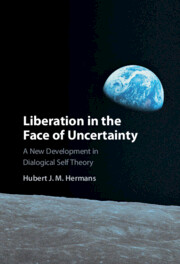Book contents
- Liberation in the Face of Uncertainty
- Liberation in the Face of Uncertainty
- Copyright page
- Dedication
- Contents
- Figures
- Tables
- Preface
- Acknowledgments
- Introduction
- Chapter 1 Playing with Plato
- Chapter 2 Centralization and Decentralization of the Self
- Chapter 3 The Other as Heaven and Hell
- Chapter 4 Re-enchantment of the World
- Chapter 5 Imprisonment and Liberation of the Self
- Chapter 6 Uncertainty in the Self
- Chapter 7 Multiple Well-Being and Other-Inclusive Happiness
- Glossary
- References
- Index
Chapter 4 - Re-enchantment of the World
Published online by Cambridge University Press: 06 January 2022
- Liberation in the Face of Uncertainty
- Liberation in the Face of Uncertainty
- Copyright page
- Dedication
- Contents
- Figures
- Tables
- Preface
- Acknowledgments
- Introduction
- Chapter 1 Playing with Plato
- Chapter 2 Centralization and Decentralization of the Self
- Chapter 3 The Other as Heaven and Hell
- Chapter 4 Re-enchantment of the World
- Chapter 5 Imprisonment and Liberation of the Self
- Chapter 6 Uncertainty in the Self
- Chapter 7 Multiple Well-Being and Other-Inclusive Happiness
- Glossary
- References
- Index
Summary
Weber’s thesis of the disenchantment of the world is interpreted as “we-prison” in Dialogical Self Theory (DST). As a counter-example, the phenomenon of awe is presented as an experience that opens the self to the wider universe. In that context, Martin Buber’s work on spirituality and Rollo May’s work on creativity are compared. The shadow sides of mystical experiences are outlined and compared with psychotic states of the mind. The work of Aldous Huxley who described the workings of mescaline as a facilitator of mystical insight is presented. Mystical experiences change the so-called “minimal self” on a more basic sensorial level, and they differ from the narrating and the positioning self. Furthermore, Donald Crosby’s “perspectivism” is incorporated in DST under the heading of “positionalism.” As a practical implication, specific guidelines are presented in order to open the self to the experience of awe as a first step to the “depositioning” of the self.
Keywords
- Type
- Chapter
- Information
- Liberation in the Face of UncertaintyA New Development in Dialogical Self Theory, pp. 119 - 161Publisher: Cambridge University PressPrint publication year: 2022



